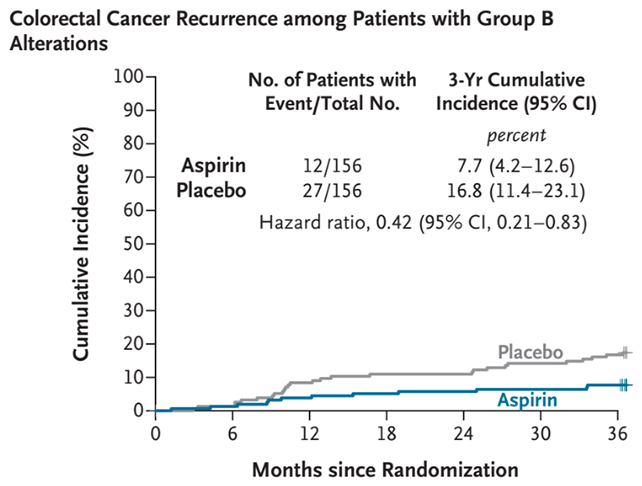A low dose of aspirin each day may significantly reduce the chances of colon and rectal cancer returning in certain cases, a new clinical trial has found.
Led by researchers from the Karolinska Institute and Karolinska University Hospital in Sweden, the study involved 626 people with stages 1 to 3 colon or rectal cancer, and specific genetic mutations in the cancer tumors.
Previous studies have suggested that cancers with these mutations – specifically in the PIK3 signaling pathway – could be targeted by aspirin, but this is the first time the hypothesis has been tested in a randomized clinical trial.
Related: No, Your Cravings Aren’t a Reliable Sign of Cancer, Expert Explains
Participants who were given aspirin daily were up to 55 percent less likely to see their cancer come back over three years, compared to those taking placebos. For those in the aspirin group, there was a 7.7 percent chance of cancer coming back within the three years covered by the study. For the placebo group, the chances were 14.1 to 16.8 percent, depending on the type of mutation.
“Aspirin is a drug that is readily available globally and extremely inexpensive compared to many modern cancer drugs, which is very positive,” says Karolinska Institute surgeon Anna Martling.

Based on this trial and earlier research, researchers suspect that aspirin fights cancer in three ways: it reduces inflammation, it restricts tumor growth, and it limits the function of the platelets (blood cells) that can be used as shields by cancer cells as tumors spread. It’s also thought that aspirin may disrupt the PIK3 signaling pathway, which is hypothesized to help cancer tumors grow.
Further research could help determine exactly why aspirin appears to reduce the risk of colorectal cancer returning.
“Although we do not yet fully understand all the molecular links, the findings strongly support the biological rationale and suggest that the treatment may be particularly effective in genetically defined subgroups of patients,” says Martling.
With around 30 to 40 percent of the 2 million people diagnosed with colorectal cancer every year experiencing a recurrence of the disease, a simple way to reduce risk could save a lot of lives.
Low-dose aspirin has previously been linked to other health benefits, including reduced chances of repeat heart attacks and strokes. At the same time, research has also highlighted associations between aspirin and an elevated risk of other health problems, including internal bleeding.
The good news is that cancers are already screened for critical mutations, which in this study accounted for a little over 1 in 3 colorectal cancers – a substantial number of cases that could potentially be targeted.
“Aspirin is being tested here in a completely new context as a precision medicine treatment,” says Martling. “This is a clear example of how we can use genetic information to personalize treatment and at the same time save both resources and suffering.”
The research has been published in the New England Journal of Medicine.
Source link


